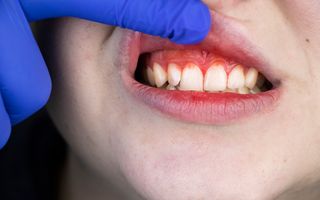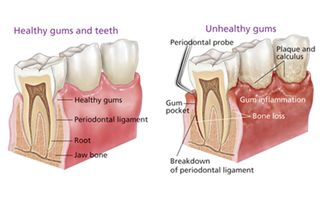Periodontics (gum disease)
Caring for and treating the gums and other supportive structures.

A continuous care programme for your teeth and gums is equally beneficial for both children and adults. Implementing a preventive dentistry philosophy as part of your ongoing general and oral health routine often results in less treatment time and reduced cost for dental procedures.
Regular Dental Maintenance
A continuous care programme for your teeth and gums is equally beneficial for both children and adults. Implementing a preventive dentistry philosophy as part of your ongoing general and oral health routine often results in less treatment time and reduced cost for dental procedures.
Scheduling and attending appointment check-ups every six months enables the Richmond Fine Dentistry team to assess and monitor your oral health. This is especially vital for children as their teeth and facial bone structure are still developing. By monitoring this development, we can diagnose and correct any structural problems.
Gum disease in its early stage is not only treatable but also reversible. Gingivitis is caused by the accumulation of plaque and calculus on your teeth causing gum irritation and inflammation resulting in swollen and tender gums that bleed when brushing and flossing.
Periodontitis is the advanced stage of gum disease and is the leading cause of adult tooth loss. It is estimated that 80% of adults will be affected by some form of gum disease at some point in their lifetime; making the practice of preventive dentistry just as important for you as it is for your children. Although a good daily oral hygiene routine will decrease your chances of developing gum disease, it will not eliminate it totally.

Between your gums and teeth is a small “V” shaped area known as the sulcus. Periodontal (gum) disease is an infection that affects this space and causes the supportive tissues to pull away from your teeth. This is called a gum pocket and allows bacteria to build-up around the tooth root. This causes an infection and irreparable damage to the supportive bone, which in turn leads to the tooth becoming loose and eventually falling out.
Only through having your teeth professionally cleaned, a procedure called root planning and scaling using specially developed fine instruments to smooth the surface of your tooth, is it possible to remove the build-up of calculus (tartar) from your tooth surface and below your gum-line, as this cannot be accomplished by brushing and flossing.
Another side effect of gum disease is constant bad breath. This can be embarrassing situation that many sufferers are unaware of. Clinically known as halitosis, it is caused by the accumulation of bacteria in your mouth and made worse by poor oral hygiene, tooth decay and gum disease producing a constant odour.
To maintain your oral health between hygiene appointments, brush your teeth with a fluoride toothpaste twice a day for at least two minutes using a soft-bristled toothbrush with a small head to enable you to reach all areas of your mouth. Floss at least once a day to remove any food caught between your teeth not able to be removed through brushing, we recommend you floss before bed so as to remove any food caught between your teeth from your daily meals. Please feel free to talk to our team for effective brushing and flossing advice.
Preventing gum disease extends beyond achieving and maintaining your oral health; numerous studies over recent years have also linked gum disease to an increased risk of other concerning general health conditions, namely heart disease, respiratory disease, stroke and lower birth weights of newborns. This is an area of emerging interest and much research is being undertaken.

Between your gums and teeth is a small “V” shaped area known as the sulcus. Periodontal (gum) disease is an infection that affects this space and causes the supportive tissues to pull away from your teeth. This is called a gum pocket and allows bacteria to build-up around the tooth root. This causes an infection and irreparable damage to the supportive bone, which in turn leads to the tooth becoming loose and eventually falling out.
Only through having your teeth professionally cleaned, a procedure called root planing and scaling using specially developed fine instruments to smooth the surface of your tooth, is it possible to remove the build-up of calculus (tartar) from your tooth surface and below your gum-line, as this cannot be accomplished by brushing and flossing.
Another side effect of gum disease is constant bad breath. This can be embarrassing situation that many sufferers are unaware of. Clinically known as halitosis, it is caused by the accumulation of bacteria in your mouth and made worse by poor oral hygiene, tooth decay and gum disease producing a constant odour.
Preventing gum disease extends beyond achieving and maintaining your oral health; numerous studies over recent years have also linked gum disease to an increased risk of other concerning general health conditions, namely heart disease, respiratory disease, stroke and lower birth weights of newborns. This is an area of emerging interest and much research is being undertaken.
Why do my gums bleed when I brush?
Bleeding gums are usually caused by gum disease. Gum disease affects most people at some time in their life, and can be due to illness, pregnancy, change in hormones or other factors..
The need to treat bleeding gums has wider health implications and research supports that the detection and treatment of periodontal disease, including the regular removal of plaque, helps to lower a patient’s cardiovascular risk along with smoking cessation, blood pressure and cholesterol control and management.
Gum disease will go unnoticed if a patient is not seeing their dentist or hygienist regularly and because gum disease is often painless patients don’t realise they have the onset of periodontal disease.
Gum disease plays a role in cardiovascular disease, pulmonary infections and diabetes. Unhealthy gums cause bad breath, loss of teeth and can affect your confidence and smile. Have a comprehensive exam with us and we will screen you for gum disease with charting measurements and, if there is a problem, help you achieve a realistic outcome and maintain a healthy mouth without bleeding gums. Some patients’ disease will have progressed so far that they will always have the disease process occurring, but maintenance with our hygienist or a periodontist will assist in maintaining a stable oral environment to give you the best chance of keeping your teeth well into the future.
Click here to contact us today for more information or to book an appointment to treat bleeding gums in Melbourne.
Frequently asked questions
Periodontitis is the advanced form of gingivitis, a disease where your gums become infected. Gingivitis and periodontitis come from poor oral health, such as not brushing and flossing well or often enough, and consuming a diet high in sugary foods and drinks.
While gingivitis can be reversed with good oral health and a professional clean from your dental hygienist, periodontitis cannot be reversed. Once the disease has reached this stage, it becomes about managing the symptoms and stopping it from getting worse.
Unfortunately, there is no treatment or medication that can ‘heal’ periodontal disease. Once you have it, your periodontist will help you to manage the symptoms through measures such as regular cleanings and flap surgery.
The best treatment for gum infection is good oral hygiene at home, including brushing and flossing, and avoiding a diet high in sugary foods and drinks. It is also important to visit your dentist for a professional cleaning and further treatment options if needed.
A Periodontist is a specialist kind of dentist who focuses solely on the periodontal area of the mouth - the gums and jawbone beneath the gums. They perform a variety of treatments, from simple procedures such as removing plaque from teeth to implanting false teeth and doing gum grafts.
Their job is to ensure your gums are healthy and well enough to support your teeth and, therefore, your oral health overall.

